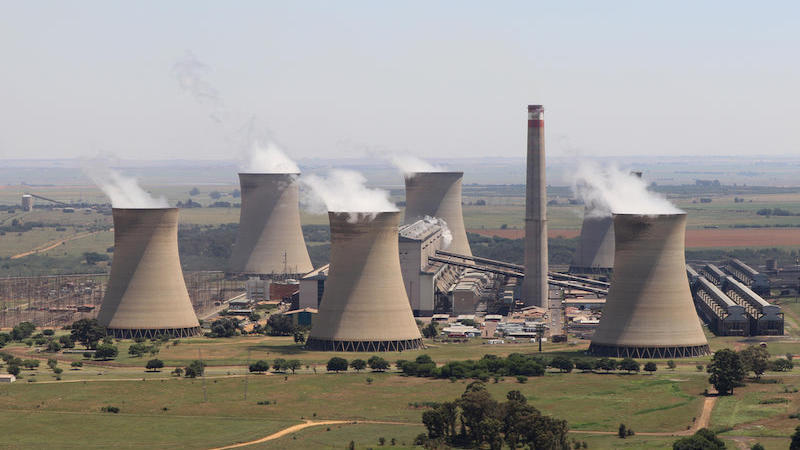Despite a multi-billion dollars clean energy transition deal, South Africa expects to keep coal plants running for longer while it battles electricity blackouts.
Rich nations “understand” South Africa’s immediate need to keep coal power plants running for longer to tackle electric power cuts despite an $8.5 billion clean energy transition deal, a German government spokesperson told Climate Home.
But they warned the South African government should not row back from a clear commitment to cutting long-term emissions.
South African President Cyril Ramaphosa told Parliament last week the timetable to shift away from coal “must be relooked at” while the country struggles with crippling daily blackouts.
The US, UK, EU, Germany and France are contributing funds for a landmark plan, known as a Just Energy Transition Partnership (JetP) to clean up South Africa’s coal-reliant electricity system.
Local business group tries to keep South Africa’s coal plants alive
A spokesperson for the German development ministry told Climate Home the group of rich countries behind the JetP show “understanding for the current emergency and sees the need for short-term measures” in South Africa.
But they also warned against backsliding on the coal to clean energy transition: “A clear commitment by the South African government to long-term emission reduction strategies is and remains an important component of our cooperation”.
Uncertain plans
The programme hinges on the ability to replace most of its 14 existing coal power plants with solar and wind power.
South Africa’s coal plants often produce less electricity than the country needs and state-owned energy firm Eskom respond by implementing planned power cuts, which it calls load shedding.
These can last up to 10 hours and have significantly worsened over the last year, angering citizens and businesses and damaging Ramaphosa’s popularity ahead of elections next year.
Ageing and unreliable coal-fired power plants frequently breaking down and Eskom’s dire financial situation have been blamed for the crisis.
Now the government is considering delaying the closure of further coal power plants to help ease electricity cuts.
“Our own pace”
Rampaphosa told the National Assembly last week that “we will transition to cleaner energy but at our own pace and own time”.
“We have got to do it, taking into account the needs of our people and the requirements of energy security”, he added.
Alongside the closure and repurposing of coal-fired power plants, the partnership is also meant to cover an expansion of social protection and retraining for workers who lose their jobs.
But an investigation by Climate Home News and Oxpeckers found coal-reliant communities have scarce details on how funds for re-skilling will be invested.
The uncertain prospects are fuelling hostility to the programme in coal heartlands. A proposal from a business group to keep coal power plants alive is gaining support from local politicians and some residents, Climate Home News has found.
Debt concerns
The type of financing offered has been another continuing sticking point in the rich nations partnership with South Africa.
Grants make up only 3% of the package. The rest is loans, raising concerns South Africa’s debt burden.
Just over half of the funding is earmarked as concessional loans, with better-borrowing terms than South Africa can access on the open market.
US backs Indonesian oil refinery despite pledge to end fossil fuel finance
Like South Africa, Germany has kept coal plants open for longer than it wanted because of a short-term crisis.
After Russia invaded Ukraine, Germany and the rest of Europe sought to drastically reduce their reliance on Russian gas.
To ensure that the supply of electricity met demand over the winter of 2022, Germany temporarily re-opened two coal power plants. Overall though, the crisis has sped up Europe’s transition away from fossil fuels to renewables.










